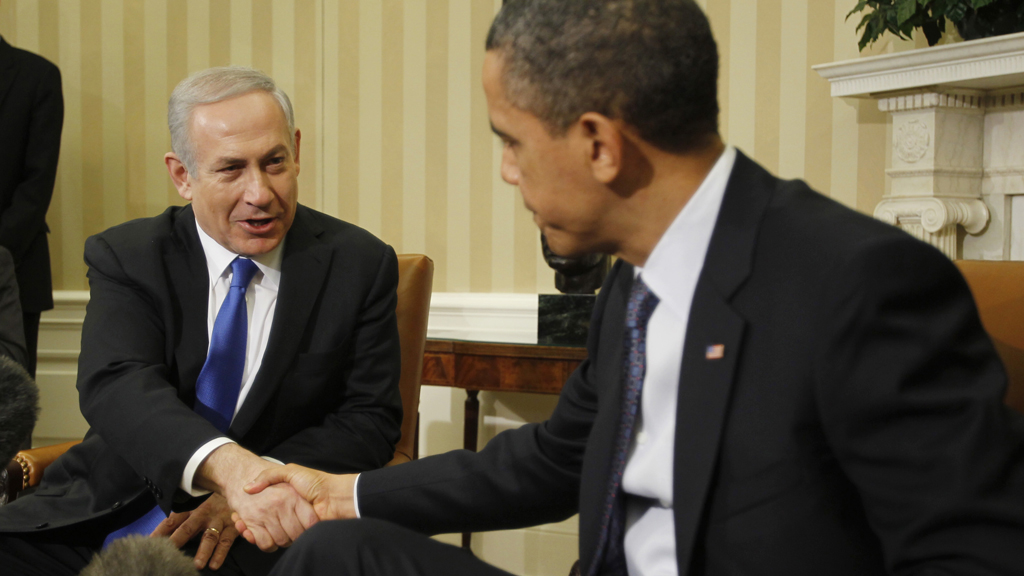Iran nuclear row: diplomacy or military strikes?
World powers have ratcheted up the diplomatic pressure on Iran over fears that its alleged efforts to achieve nuclear weapons capability will provoke a military attack from Israel.

Diplomats say the US and its Western allies have persuaded Russia and China to join in criticising Iran‘s nuclear defiance to demonstrate to Israel that diplomacy is an alternative to force in pressuring Tehran.
The USA, France, Russia, Germany, China and Britain have proposed a resolution to be put forward at Thursday’s meeting of the 35-member board of the International Atomic Energy Agency (IAEA).
The draft text, urging Iran to stop activities that could be used to make a bomb, cannot be enforced. But it is significant in seeking to show international resolve on engaging Iran at a time of increased Israeli warnings that time is running out for diplomacy.
In all likelihood, it will be in Obama’s second term that the Iran issue will finally come to a head. Jonathan Rugman
Iran denies any interest in nuclear arms.
But Professor Anoush Ehteshami of the University of Durham told Channel 4 News he thinks that the threat is not as acute as it has been due to problems between the US and Israel: “I think we know that a strike is not imminent.
“This public tiff between the US and Israel shows they’re nowhere near agreeing, whereas last week we tended to assume that they had their ducks in a row so to speak.”
MI6 visit
Meanwhile, international efforts to dissuade Israel from taking unilateral action against its pariah neighbour continue. MI6 has declined to confirm reports that the head of the agency, Sir John Sawers, visited the Israeli Prime Minister Benjamin Netanyahu to ask him not to take military action against Iran.
The Haaretz newspaper in Jerusalem quoted an unnamed Israeli source as saying that a high-ranking British official had paid a secret visit to meet Mr Netanyahu and his Defence Minister Ehud Barak, as well as a number of security and diplomatic officials, and deliver a “stern message” from Mr Cameron.
The source said the envoy warned against “an uncoordinated Israeli strike on Iran at this time” and stressed that Britain believes there is still time for diplomatic measures to work.
And relations between Israel and its long-time powerful ally the United States are distinctly chilly.
Israel is demanding guidance from the US on the ongoing stand-off which is further complicated by presidential elections taking place in the US, its traditional ally.
Mr Netanyahu has publicly criticised US President Barack Obama for not making a tougher stand against Iran and has told him there need to be so-called “red lines” for Iran which, if crossed, will have consequences.
And Prof Ehteshami agrees that the US has not been clear with its smaller ally though he believes there are good reasons for that: “Netanyahu is right; what is the red line for Iran?
“But the question for me is how can the US define a red line when they’re still talking about the Iran situation at the IAEA talks? Also, Russia and China wouldn’t stand for any action against Iran, at least until the IAEA talks are concluded.”
Channel 4 News Foreign Affairs Correspondent Jonathan Rugman explains why Israel is increasing pressure on the US over Iran:
Israel’s prime minister seems to be losing patience – not just with Iran’s nuclear programme, but with the United States.
Mr Netanyahu is angry with America because its Secretary of State Hillary Clinton says she’s “not setting deadlines” for the end of diplomacy with Iran.
The Israeli leader doesn’t say it, but he’s also probably angry that there’s a fair chance Mr Obama will be re-elected in November, which forces a choice on Israel.
It could attack Iran between now and November. The advantage of this window would be that Mr Obama might be forced by circumstance to support such a move – the circumstance being that Obama needs Jewish votes, and specifically Jewish votes in Florida, to get himself re-elected.
Yet if Israel waits to attack until after Obama is re-elected, White House support might be lukewarm at best. Put very simply, any US president in his final term is less likely to be influenced by the Jewish lobby in the United States.
Netanyahu therefore seems to be inserting himself into the US election in order to get what he wants – declarations of support from Obama – which Israel can take to the bank and call upon in Obama’s second term.
Because, in all likelihood, it will be in Obama’s second term that the Iran issue will finally come to a head.
Israel is not afraid to act unilaterally when required. Operation Opera in 1981 was an Israeli strike on the site of the Osirak nuclear reactor south-east of Baghdad which had previously been bombed by the Iranians during the war between with Iraq.
But Iran is a much more politically fraught proposition and as Anoush Ehteshami points out, the situation now is not the same: “The Osirak strike was different, the region was very different then compared to how it is now. The forces are not lined up to provide Israel with the cover to carry out a unilateral strike as they have been in the past.
“Don’t forget that in 2007, Israel hit Syria’s nuclear facility and made very little noise about it. This time around that won’t be possible because everyone is watching.”